Lime Crime: Leveraging the Crowds for “Makeup for Unicorns”

Lime Crime is an indie, cruelty free makeup brand created by the eccentric Doe Deere, a self-proclaimed misfit and a fan of 90s inspired grunge makeup. The company is best known for the innovative, trend setting and non-traditional color scheme of their lipsticks, nail polishes and eyeshadows (purple, lavender, yellow, black, olive, blue etc. are a couple examples). Deere launched her company in 2008 when she was a popular user on LiveJournal, a predecessor to MySpace / Facebook. It has grown to be a cult brand among its followers, due to, in my opinion, the founder’s high touch, genuine approach into its communication with its fans, and her efforts in making each of them feel special (more on that below). Their motto is “makeup for unicorns”: the company believes makeup is not only to cover imperfections, but it’s a form of freedom and self-expression and that everybody is unique. What pushes me to write about them is their incredible success in managing the crowds and engaging with them to turn this interaction into a profitable business. As an avid customer and a follower of their growing online presence, I think they are at a stage where they can take even more advantage of crowdsourcing with the incredible asset they have, that is the very loyal and engaged user base.
Lime Crime has a global, rapidly growing social media reach of 2.5M+. The Instagram feed has ~2m followers, and Facebook page has 700K likes. For a small brand founded by a person this is quite big, considering for instance that L’Oreal’s Instagram page only has 1/3rd of Lime Crime’s followers. Their Intagram posts get about 20K likes each vs. L’Oreal’s at 6K without the marketing budget of a giant (in fact they do no marketing outside of social media). Their appearance at makeup events/fairs is always a big splash, as you see happy and eager customers line up in endless queues to get their hands on the latest shades.
The relationship that the founder has been able to build with its followers is one that’s hard to beat. There are a couple things Deere does to manage her crowd and create a powerful brand:
- Personal touch: Doe shares stories of her adolescence when she “felt different from everybody else”, shares pictures of goth makeup she rocked back then and tells details on how she grew up not really trusting herself. She sprinkles her posts with very encouraging and feel-good mottos based on her own success story, which seems to resonate really well with her fan base given they are also a bit like Doe, not really fitting into the mold.
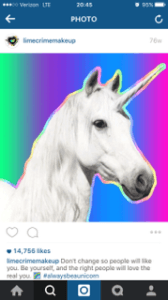
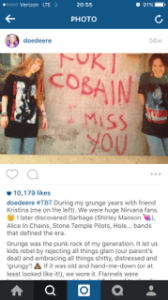
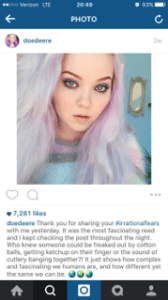

- Product Feedback: Doe regularly shares details about products in the making and solicits feedback about whether her fans like a particular shade or not. She and her team go through every post by the fans and take data into consideration
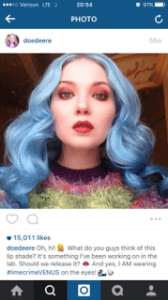
- #Inspo: They regularly post pictures by makeup artists using their products or other products to give creative ideas to their fan base.
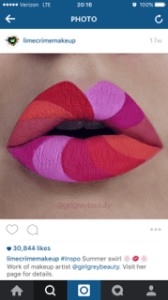
- Limited edition: Lime Crime is still a small company and their operations seem to be far from perfect, especially around estimating how much of each new product it should and can create to satisfy customer demand. Product sold-outs are very regular, and this creates a sensation of “I have to buy this right now or else I may have to wait for another month” with the loyal fan base
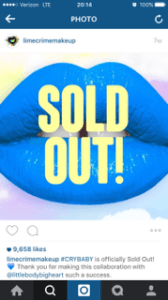
- Fan engagement: they encourage fans to post pictures of themselves in Lime Crime products to be featured on the Instagram feed every Friday (dubbed Fan Friday)
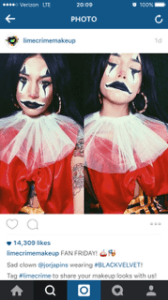
Value creation is in the production of shades that no other mass-market makeup company is interested in producing due to its niche focus. Also, value creation for the fans happens when they use the products that make them feel like unicorns! When I sport a shade that is on no one else and I get compliments because of it, I’m a happy customer.
Value capture occurs through selling the products worldwide for a fee that is usually higher than mass-market makeup, which can be rationalized by the small batch, artisanal production, and the value creation of the brand for its fans. It was rumored that they already had sales in the $10m range. They also got picked up by retail giant UrbanOutfitters which now features a selection of their products.
With such tight-knit, responsive, eager, cult community, I definitely believe that Lime Crime has more room to grow even more explosively if it leverages this crowd more in the creation phase of its products (in form of new categories of products to introduce (i.e. hair dye) or what shades they should produce next and use the most power users just like Nivea did in the introduction of the Invisible deodorant for distilling the ideas they have at hand. This would give the customers even more ownership on what was created and in turn make the loyalty stronger.



What is interesting about Lime Crime and developing an “authentic,” direct relationships with your customers is what happens when things go wrong… Lime Crime recently got a ton of bad press for a warning label the company received from the FDA, which accused the company of using ferric ferrocyanide and ultramarines in their products (as listed on the ingredient label,) which violates the Federal Food, Drug, and Cosmetic Act. Because Lime Crime is a cult brand with a loyal social media following, the company used Instagram to tell their concerned customers that the violation was due to a misprint on the product’s packaging, which is highly unlikely. They also added a formal response on their website stating that the ingredients in question are not in their products:
https://www.limecrime.com/FDA
It is unclear if Lime Crime handled the scandal ethically, but it will be interesting to see how these “authentic,” close-to-the-customer brands deal with scandals that could ultimately create distrust among consumers, threatening “cult” status.